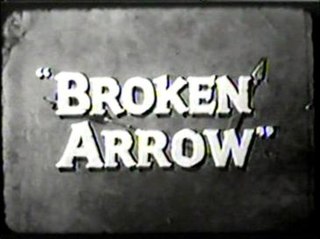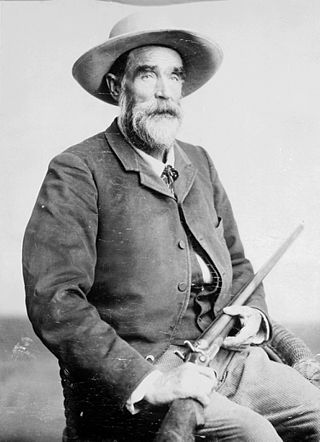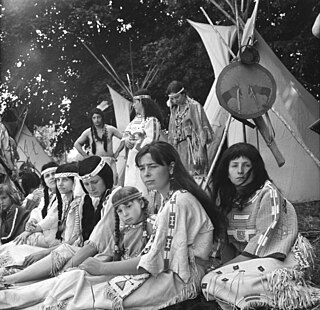
Cochise was the Mexican leader of the Chiricahui local group of the Chokonen and principal nantan of the Chokonen band of a Chiricahua Apache. A key war leader during the Apache Wars, he led an uprising that began in 1861 and persisted until a peace treaty was negotiated in 1872. Cochise County is named after him.

Louis Dearborn L'Amour was an American novelist and short story writer. His books consisted primarily of Western novels, though he called his work "frontier stories". His most widely known Western fiction works include Last of the Breed, Hondo, Shalako, and the Sackett series. L'Amour also wrote historical fiction, science fiction, non-fiction (Frontier), and poetry and short-story collections. Many of his stories were made into films. His books remain popular and most have gone through multiple printings. At the time of his death, almost all of his 105 existing works were still in print, and he was "one of the world's most popular writers".

Carson McCullers was an American novelist, short-story writer, playwright, essayist, and poet. Her first novel, The Heart Is a Lonely Hunter (1940), explores the spiritual isolation of misfits and outcasts in a small town of the Southern United States. Her other novels have similar themes. Most are set in the Deep South.

Broken Arrow is a Western television series that ran on ABC-TV in prime time from September 25, 1956, through September 18, 1960..The show was based on the 1947 novel Blood Brothers, by Elliott Arnold, which had been made into a film in 1950, starring James Stewart as Tom Jeffords and Jeff Chandler playing as Cochise.

Broken Arrow is a 1950 American revisionist Western film directed by Delmer Daves and starring James Stewart, Jeff Chandler, and Debra Paget. The film is based on historical figures, but fictionalizes their story in dramatized form. It was nominated for three Academy Awards, and won a Golden Globe Award for Best Film Promoting International Understanding. Film historians have said that the film was one of the first major Westerns since the Second World War to portray Native Americans sympathetically.

The revisionist Western, also called the anti-Western, is a sub-genre of the Western film. Called a post-classical variation of the traditional Western, the revisionist subverts the myth and romance of the traditional by means of character development and realism to present a less simplistic view of life in the "Old West". While the traditional Western always embodies a clear boundary between good and evil, the revisionist Western does not.
The tragic mulatto is a stereotypical fictional character that appeared in American literature during the 19th and 20th centuries, starting in 1837. The "tragic mulatto" is a stereotypical mixed-race person, who is assumed to be depressed, or even suicidal, because they fail to completely fit into the "white world" or the "black world". As such, the "tragic mulatto" is depicted as the victim of the society that is divided by race, where there is no place for one who is neither completely "black" nor "white".

Thomas Jefferson Jeffords was a United States Army scout, Indian agent, prospector, and superintendent of overland mail in the Arizona Territory. His friendship with Apache leader Cochise was instrumental in ending the Indian wars in that region. He first met Cochise when he rode alone into Cochise's camp in 1871 to request that the chief come to Canada Alamosa for peace talks. Cochise declined at least in part because he was afraid to travel with his family after the recent Camp Grant Massacre. Three months later he made the trip and stayed for over six months during which time their friendship grew while the negotiations failed. Cochise was unwilling to accept the Tularosa Valley as his reservation and home. In October 1872, Jeffords led General Oliver O. Howard to Cochise's Stronghold, believed to be China Meadow, in the Dragoon Mountains. Cochise demanded and got the Dragoon and Chiricahua Mountains as his reservation and Tom Jeffords as his agent. From 1872 to 1876, there was peace in southern Arizona. Then renegade Apaches killed Nicholas Rogers who had sold them whiskey and the cry went out to abolish the reservation and remove Jeffords as agent. Tom Jeffords embarked on a series of ventures as sutler and postmaster at Fort Huachuca, head of the first Tucson water company trying to bring artesian water to that city, and as prospector and mine owner and developer. He died at Owl Head Buttes in the Tortolita Mountains 35 miles north of Tucson.
Racial passing occurs when a person who is classified as a member of a racial group is accepted or perceived ("passes") as a member of another racial group. Historically, the term has been used primarily in the United States to describe a black or brown person or of multiracial ancestry who assimilated into the white majority to escape the legal and social conventions of racial segregation and discrimination. In the Antebellum South, passing as white was a temporary disguise used as a means of escaping slavery. Other instances include cases of Jews in Nazi Germany attempting to pass as "Aryan" and non-Jewish to escape persecution.
Elliott Arnold was an American newspaper feature writer, novelist, and screenwriter. Born in Brooklyn, New York, he became a feature writer with the New York World-Telegram and authored dozens of novels.
Rebecca Bryan Boone was an American pioneer and the wife of famed frontiersman Daniel Boone. She began her life in the Colony of Virginia (1606–1776), and at the age of ten moved with her grandparents and extended family to the wilderness of the Province of North Carolina. It was there that she met her future husband, Daniel Boone. Rebecca Boone raised ten of her own children and eight nephews and nieces that she and Daniel had adopted. Since Daniel was away for extended hunting and exploration trips, sometimes for several years at a time, Boone generally raised and protected their eighteen children by herself. Living in the frontier, and needing to be self-reliant, she was a healer, midwife, sharpshooter, gardener, tanner, and weaver. The family was subject to attacks by Native Americans as their land was encroached upon by white settlers and by bands of white men, called highwaymen, who attacked settlers. Several times she and her family left their home for shelter and protection in nearby forts and in one case lived several years in Culpeper County, Colony of Virginia, during the Anglo-Cherokee War.

Chief Yowlachie , also known as Daniel Simmons; was a Native American actor from the Yakama tribe in the U.S. state of Washington, known for playing supporting roles and bit parts in numerous films. He is perhaps best known for playing Two Jaw Quo, Nadine Groot's assistant cook, in the classic 1948 Western Red River.

The portrayal of Indigenous people of the Americas in popular culture has oscillated between the fascination with the noble savage who lives in harmony with nature, and the stereotype of the uncivilized Red Indian of the traditional Western genre. The common depiction of American Indians and their relationship with European colonists has however changed over time.

Native Americans in German popular culture have, since the 18th century, been a topic of fascination, with imaginary Native Americans influencing German ideas and attitudes towards environmentalism, literature, art, historical reenactment, and German theatrical and film depictions of Indigenous Americans. Hartmut Lutz coined the term Indianthusiasm for this phenomenon.

Redface is the wearing of makeup to darken or redden skin tone, or feathers, warpaint, etc. by non-Natives to impersonate a Native American or Indigenous Canadian person, or to in some other way perpetuate stereotypes of Indigenous peoples of Canada and the United States. It is analogous to the wearing of Blackface. In the early twentieth century, it was often white performers, who wore blackface or redface when portraying Plains Indians in Hollywood Westerns. In the early days of television sitcoms, "non-Native sitcom characters donned headdresses, carried tomahawks, spoke broken English, played Squanto at Thanksgiving gatherings, received 'Indian' names, danced wildly, and exhibited other examples of representations of redface".

Rebecca Roanhorse is an American science fiction and fantasy writer from New Mexico. She has written short stories and science fiction novels featuring Navajo characters. Her work has received Hugo and Nebula awards, among others.
Racial or ethnic misrepresentation occurs when someone deliberately misrepresents their racial or ethnic background. It may occur for a variety of reasons, such as someone attempting to benefit from affirmative action programs for which they are not eligible.
Pretendian is a pejorative colloquialism describing a person who has falsely claimed Indigenous identity by professing to be a citizen of a Native American or Indigenous Canadian tribal nation, or to be descended from Native American or Indigenous Canadian ancestors. As a practice, being a pretendian is considered an extreme form of cultural appropriation, especially if that individual then asserts that they can represent, and speak for, communities from which they do not originate.